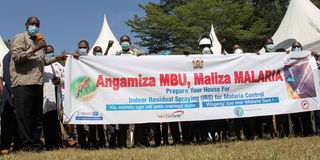Homa Bay launches fourth phase of indoor spraying to fight malaria

Homa Bay County Health Executive, Prof Richard Muga, (left) during the launch of the fourth phase of indoor residual spraying in Homa Bay Town on March 10, 2021.
The Homa Bay County government has launched the fourth phase of indoor residual spraying (IRS) in a renewed fight against the spread of Malaria, an epidemic in the region.
Malaria has been one of the major killer diseases in Homa Bay, with majority of victims being expectant women and children below the age of five years.
Over the next 24 days, 1,205 health officers will be spraying insecticides in at least 233, 989 structures to kill female anopheles mosquitoes which are the vectors that transmit malaria.
IRS uses chemicals sprayed on walls to control the disease.
According to a 2015 malaria indicators survey, the disease has affected 26 per cent of the county’s population.
Other interventions
Besides the IRS, both the national and county governments are using other interventions to fight the disease, including immunisation of infants and mass distribution of mosquito nets.
Research is also ongoing on first line multiple therapy that involves the use of a combination of strong malaria control drugs that was launched last year by Health Chief Administrative Secretary Rashid Aman.
This year's IRS is being supported by the US government in partnership with the county government of Homa Bay at Sh282 million, with the devolved unit contributing Sh12 million.
Promote good health
Homa Bay Deputy Governor Hamilton Orata, County Health Executive Richard Muga and County Director of Preventive and Promotive Health Services Adel Ottoman launched the IRS programme on Wednesday which aims at promoting good health.
Mr Orata, who was accompanied by Dr Elie Bankineza, the Chief of Party at PMIVectorlink Project, said the exercise will help improve the health of residents by reducing malaria infections.
“The county cannot take malaria infections for granted. We must use all available resources to fight the disease,” Mr Orata said.
He called on residents to collaborate with officials who will be spraying homes to enable them do it effectively.
“No one should resist this noble course that is meant to eliminate malaria in our county,” the deputy governor said.
Prof Muga said the programme will not be undertaken in Mfangano Ward in Suba North Constituency because of lack of funds.
"Homes in all wards will be sprayed with insecticides apart from Mfangano Island. We are optimistic that all the interventions will cushion residents from contracting malaria. We do not expect high rates of infections in the future as we have seen in the past," Prof Muga said.
He asked communities to have their houses ready for spraying with the insecticides.
A similar activity started in Migori County, which is also faced with high malaria prevalence.





